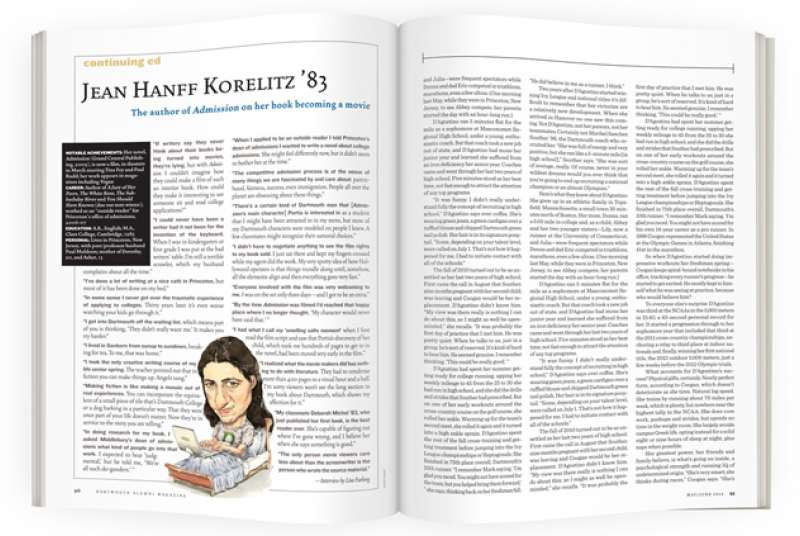
Jean Korelitz ’83
Notable Achievements: Her novel, Admission (Grand Central Publishing, 2009), is now a film, in theaters in March starring Tina Fey and Paul Rudd; her work appears in magazines including Vogue
Career: Author of A Jury of Her Peers, The White Rose, The Sabbathday River and You Should Have Known (due out next winter); worked as an “outside reader” for Princeton’s office of admissions, 2006-07
Education: A.B., English; M.A., Clare College, Cambridge, 1985
Personal: Lives in Princeton, New Jersey, with poet/professor husband Paul Muldoon; mother of Dorothy, 20, and Asher, 13
“If writers say they never think about their books being turned into movies, they’re lying, but with Admission I couldn’t imagine how they could make a film of such an interior book. How could they make it interesting to see someone sit and read college applications?”
“I could never have been a writer had it not been for the invention of the keyboard. When I was in kindergarten or first grade I was put at the bad writers’ table. I’m still a terrible scrawler, which my husband complains about all the time.”
“I’ve done a lot of writing at a nice café in Princeton, but most of it has been done on my bed.”
“In some sense I never got over the traumatic experience of applying to colleges. Thirty years later it’s even worse watching your kids go through it.”
“I got into Dartmouth off the waiting list, which means part of you is thinking, ‘They didn’t really want me.’ It makes you try harder.”
“I lived in Sanborn from sunup to sundown, breaking for tea. To me, that was home.”
“I took the only creative writing course of my life senior spring. The teacher pointed out that in fiction you can make things up. Angels sang.”
“Making fiction is like making a mosaic out of real experiences. You can incorporate the equivalent of a small piece of tile that’s Dartmouth College or a dog barking in a particular way. That they were once part of your life doesn’t matter. Now they’re in service to the story you are telling.”
“In doing research for my book, I asked Middlebury’s dean of admissions what kind of people go into that work. I expected to hear ‘judgmental,’ but he told me, ‘We’re all such do-gooders.’ ”
“When I applied to be an outside reader I told Princeton’s dean of admissions I wanted to write a novel about college admissions. She might feel differently now, but it didn’t seem to bother her at the time.”
“The competitive admission process is at the nexus of many things we are fascinated by and care about: parenthood, fairness, success, even immigration. People all over the planet are obsessing about these things.”
“There’s a certain kind of Dartmouth man that [Admission’s main character] Portia is interested in as a student that I might have been attracted to in my teens, but none of my Dartmouth characters were modeled on people I knew. A few classmates might recognize their sartorial choices.”
“I didn’t have to negotiate anything to see the film rights to my book sold. I just sat there and kept my fingers crossed while my agent did the work. My very spotty idea of how Hollywood operates is that things trundle along until, somehow, all the elements align and then everything goes very fast.”
“Everyone involved with the film was very welcoming to me. I was on the set only three days—and I got to be an extra.”
“By the time Admission was filmed I’d reached that happy place where I no longer thought, ‘My character would never have said that.’ ”
“I had what I call my ‘smelling salts moment’ when I first read the film script and saw that Portia’s discovery of her child, which took me hundreds of pages to get to in the novel, had been moved very early in the film.”
“I realized what the movie makers did has nothing to do with literature. They had to condense more than 400 pages to a visual hour and a half. I’m sorry viewers won’t see the long section in my book about Dartmouth, which shows my affection for it.”
“My classmate Deborah Michel ’83, who just published her first book, is the best reader ever. She’s capable of figuring out where I’ve gone wrong, and I believe her when she says something is good.”
“The only person movie viewers care less about than the screenwriter is the person who wrote the source material.”










